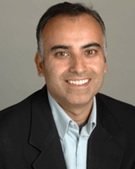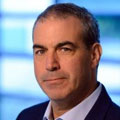UCLA PGP PRO | Dec 2020 – Classroom Module 1: Global Strategy Frameworks, Branding and Marketing

In this first in-class module from UCLA, you will learn from professors who have won several teaching awards at UCLA and other business schools for their teaching and research and are the leading experts in their fields. You will meet with Prof. Sanjay Sood and Prof. Mike Rosenberg to learn the essential skills of branding, marketing and strategy. You will learn how to build a coherent corporate strategy including brand and marketing strategy.
Faculty

Prof. Sanjay Sood
Professor of Marketing Sanjay Sood, who holds both an MBA from Kellogg and a Ph.D. from Stanford, says that incorporating real-world experience can dramatically improve the classroom experience. That’s why for the last decade he has been teaching his classes with C-suite industry executives from MGM, P&G and Google, assigning live projects with real companies — like NBC, Universal Studios and the TED brand — and taking his students on field trips to startups, major corporations and ad agencies.
“The co-teaching model of having faculty paired with seasoned executives in the classroom for the entire 10 weeks is a differentiator for Anderson,” says Sood. “We’re one of the few business schools that emphasizes a joint classroom model of practitioners with faculty for the entire quarter. It provides extra depth to the content as well as a unique combination of academic rigor plus managerial relevance.”
Sood’s academic research focuses on two areas, brand management and behavioral decision making. “As a doctoral student I was excited by the relatively new field of branding in consumer behavior and also was fortunate to be exposed to some of the pioneers of choice architecture,” he says. “The faculty at Anderson are adept at bringing research into the classroom and I have tried to follow that lead. Academic frameworks in branding can be applied across industries, and behavioral decision making is becoming increasingly relevant to senior managers and policymakers.”
Sood helped develop what is now UCLA Anderson’s Center for Management of Enterprise in Media, Entertainment & Sports, at a time when Dean Judy Olian established entertainment and media as a strategic priority for the school. Currently, between 10 and 15 percent of Anderson classes enter media and entertainment careers. In his classes, Sood looks at movies as brands going in the same direction as other products: Whereas Hollywood used to launch a new brand weekly, the trend now is toward brand franchises.
Using psychological principles in his research, Sood examines how firms can best build, manage and leverage strong brand names. This includes investigating what brand names mean to consumers, how to manage brand portfolios, how to use brand naming strategies to launch new products and how to protect brand names from becoming diluted over time and across geographical boundaries.
In his latest work on decision making he studies the differences between how people make decisions about products versus how they make decisions about experiences — like buying a DVD versus going to see the movie in a cinema. “Experiences generally make us happier and we’re willing to pay more for an experience. We define ourselves more based on the experiences that we have in life rather than on the products that we own.
“We don’t really have strong preferences among products, typically,” he continues. “Depending on how many options are presented or the ways those options are described, it can flip us from one option to another. We really are quite fungible in terms of our preferences over time. This is important to marketing but also in the area of public policy.”
Education
Ph.D. Marketing, 1999, Graduate School of Business, Stanford University
MBA, 1992, Kellogg Graduate School of Management, Northwestern University
B.S. Electrical Engineering (with honors), 1987, University of Illinois, Urbana-Champaign

Prof. Mike Rosenberg
Mike Rosenberg is an Assistant Professor in the Strategic Management Department of IESE Business School. He began teaching part time in the MBA and Global Executive programs in 1999 and joined the faculty on a full time basis in 2003.
Professor Rosenberg lectures in IESE’s MBA and Executive Education programs where he teaches strategy, geo-politics, and sustainability and publishes a weekly blog on these topics under the title Doing Business on the Earth.
His first book is an exploration of the link between business and the environment titled Strategy and Sustainability (Palgrave Macmillan, 2015) and looks at the issue more from the perspective of business executives rather than that of environmentalists. The second book is titled Strategy and Geopolitics (Emerald, 2017) and is written to encourage business leaders to pay more attention to what is happening around the planet. Both books offer his own frameworks for looking at these two issues.
From 2004-2009, Professor Rosenberg also managed IESE’s International Executive Education Unit and is currently the Academic Director for the Advanced Management Program in Media Entertainment and has co-edited Managing Media Businesses (Palgrave Macmillan, 2017) which is based on the course. Rosenberg is also Academic Director of Short course called Leading in a Matrix Organization at IESE’s building in New York City as well as a number of Custom Programs for corporate clients of the school.
Prior to join IESE Business School, Rosenberg was the Automotive Practice Leader of Heidrick & Struggles and before that spent 15 years as a Management consultant in Europe, North America and Asia for A.T. Kearney and for Arthur D. Little primarily in the automotive sector.
Education
Doctor of Philosophy (Management), Cranfield University
Master’s in Business Administration, IESE, University of Navarra
Bachelor of Science in Engineering, University of Michigan
Learning Objectives:
By the end of the first in-class UCLA module, you will be able to:
- Understand what makes for a good branding and marketing strategy
- Learn from the most successful brand campaigns of all time
- Assess consumer response, brand loyalty and stickiness
- Develop an ability to understand and craft a marketing strategy
- Understand various elements of a good corporate strategy
- Analyze the strategy of an organization
Classroom Methods & Schedule:
The classroom module will use various exercises, case studies, team assignment and class discussion to bring alive the complexities in the subject areas. It is required that you go through all the required cases as well as pre-reads and prepare for the session before the class. It will be greatly beneficial for you and the other participants to go through the material provided so that the discussion can be rich, and help clarify details with the faculty members during the in-class session.
- 25 Aug, 2021 - Prof. Sanjay Sood
- 26 Aug, 2021 - Prof. Sanjay Sood & Prof. Mike Rosenberg
- 27 Aug, 2021 - Prof. Mike Rosenberg
|
09:00 am – 10:30am |
Introduction to Marketing Management |
|
10:30 am – 11:00 am |
Coffee Break |
|
11:00 am – 12:30 pm |
Introduction to Marketing Strategy |
|
12:30 pm – 13:30 pm |
Lunch |
|
13:30 pm – 15:00 pm |
The TiVO Case |
|
15:00 pm – 15:30 pm |
Coffee Break |
|
15:30 pm – 17:00 pm |
Marketing and Brand Management |
| 09:00 am – 10:30am | Marketing and Brand Management (continued) |
| 10:30 am – 11:00 am | Coffee Break |
| 11:00 am – 12:30 pm | Branding Exercise |
| 12:30 pm – 13:30 pm | Lunch |
| 13:30 pm – 14:30 pm | Life after Covid: Getting Ready for the New Normal |
| 14:30 pm – 14:45 pm | Coffee Break |
| 14:45 pm – 15:45 pm | Global Geopolitics and its Impact on Business |
| 15:45 pm – 16:00 pm | Coffee Break |
| 16:00 pm – 17:00 pm | Strategy & Sustainability |
|
09:00 am – 10:30am |
Competitive Strategy |
|
10:30 am – 11:00 am |
Coffee Break |
|
11:00 am – 12:30 pm |
The Apple Case |
|
12:30 pm – 13:30 pm |
Lunch |
|
13:30 pm – 15:00 pm |
What is your strategy? |
|
15:00 pm – 15:30 pm |
Coffee Break |
|
15:30 pm – 17:00 pm |
What is your strategy? |
Support
Please email [email protected] for any support required with respect to the program, course or platform.
